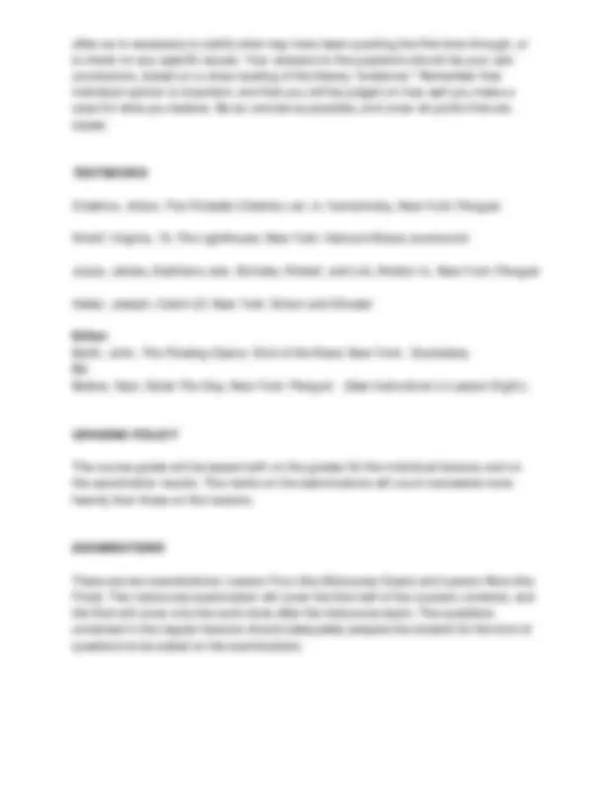



Study with the several resources on Docsity

Earn points by helping other students or get them with a premium plan


Prepare for your exams
Study with the several resources on Docsity

Earn points to download
Earn points by helping other students or get them with a premium plan
Community
Ask the community for help and clear up your study doubts
Discover the best universities in your country according to Docsity users
Free resources
Download our free guides on studying techniques, anxiety management strategies, and thesis advice from Docsity tutors
English 201, an undergraduate web course focused on modern fiction, both short stories and novels, with an emphasis on the student's personal experience. The course does not prioritize critical terminology or literary jargon, and the readings, questions, and examinations are designed for anyone interested in literature. Students are encouraged to engage with the authors and texts directly, without external resources.
Typology: Study notes
1 / 2

This page cannot be seen from the preview
Don't miss anything!


English 201 consists of significant pieces of modern fiction, both short stories and novels, American and European. Very little attention is going to be paid in this course to critical terminology or literary jargon. The emphasis throughout will be upon the student's own immediate and human experience in the reading of each work as a separate entity. Formal criticism, it must be remembered, can only come after the literary artifact, and whatever useful terminology exists (that tries to help us in the classification and understanding of individual stories and novels) is based on an intelligent and feeling perception of the primary work itself.
The readings, the questions contained in each lesson, and the midcourse and final examinations are designed for any undergraduate interested in reading and responding to an integral and vital part of his or her own world in the twentieth century. One need have no prior or special historical orientation or have done much work (if any) in other English courses. The essential prerequisites are an open and lively mind and heart, and a willingness to expend some effort, with the expectation of a good return through learning and enjoyment.
To enhance your appreciation of the universal relevance of literature, consider each work read in this course, regardless of the specific time or place in which it was written, as having been conceived by a human being passionately and intelligently occupied by the same fundamental issues every human being has had at one time or another to confront; and as being read by fellow human beings who share, consciously or not, the same pressing concerns.
Keep faith with the author by allowing him to set his own terms for his writing and by paying close attention to what he has written. As you read, give yourself to the author.
Use the literary text itself—all that was written by the creative author, starting with the title of the work and concluding with the closing words of the final page—as the basis for all interpretations. Use no study guides or other material (biographical, historical, or what-have-you) extraneous to your own direct coming to terms with what is in front of you.
Before attempting to answer the questions in any lesson, read the appropriate work carefully, and read the discussion contained in that lesson. Return to the work itself as
often as is necessary to clarify what may have been puzzling the first time through, or to check on any specific issues. Your answers to the questions should be your own conclusions, based on a close reading of the literary "evidence." Remember that individual opinion is important, and that you will be judged on how well you make a case for what you believe. Be as concise as possible, and cover all points that are raised.
Chekhov, Anton, The Portable Chekhov, ed. A. Yarmolinsky, New York: Penguin
Woolf, Virginia, To The Lighthouse, New York: Harcourt Brace Jovanovich
Joyce, James, Dubliners, eds. Scholes, Robert, and Litz, Walton A., New York: Penguin
Heller, Joseph, Catch-22, New York: Simon and Shuster
Either : Barth, John, The Floating Opera / End of the Road, New York: Doubleday Or : Bellow, Saul, Seize The Day, New York: Penguin (See instructions in Lesson Eight.)
The course grade will be based both on the grades for the individual lessons and on the examination results. The marks on the examinations will count somewhat more heavily than those on the lessons.
There are two examinations: Lesson Four (the Midcourse Exam) and Lesson Nine (the Final). The midcourse examination will cover the first half of the course's contents, and the final will cover only the work done after the midcourse exam. The questions contained in the regular lessons should adequately prepare the student for the kind of questions to be asked on the examinations.